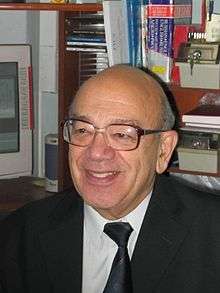Ilya Moiseev
Ilya Iosifovich Moiseev (Russian: Илья Иосифович Моисеев; born 15 March 1929, Moscow) is a Russian chemist. An expert in both kinetics and the coordination chemistry of transition metals, he made significant advances in metal-complex catalysis.[1]
Ilya Iosifovich Moiseev | |
|---|---|
 | |
| Born | March 29, 1929 Moscow, USSR |
| Citizenship | USSR, Russia |
| Education | MITHT (1952; PhD 1967) |
| Known for | metal-complex catalysis |
| Awards | Centenary Prize (2006) Demidov Prize (2012) Chugaev Prize (2012) Mendeleev Medal (2013) |
| Scientific career | |
| Fields | chemistry |
| Institutions | IGIC RAS (1963-) RGUNG Gubkin (2003-) |
| Thesis | Research in the field of chemistry of π-complexes of palladium (1967) |
Biography
Moiseev studied organic chemistry at Moscow State University of Fine Chemical Technologies (MITHT). After graduating in 1952, his first jobs were as an engineer, a junior researcher in physical chemistry, then a senior researcher in organic chemistry. Since 1963 he has worked at the N. S. Kurnakov Institute of General and Inorganic Chemistry (IGIC) of the Russian Academy of Sciences (RAS), Moscow, as head of the laboratory of metal-complex catalysis and coordination chemistry. Since 2003, he has been a professor at the Gubkin Russian State University of Oil and Gas (RGUNG Gubkin).[1]
He has also served as chairman of the Scientific Council for Gas Chemistry, RAS, and vice-president of the Russian Chemical Society.[1]
Research
By developing new principles for the design of catalytic systems he created highly efficient catalysts that enabled compounds of commercial importance to be synthesized from cheap hydrocarbons.[2] His concerns for efficiency and choice of raw materials were informed by environmental as well as economic considerations.[3] His innovations became the basis of industrial methods for the production of acetaldehyde from ethylene, the synthesis of formic acid from carbon monoxide and water, the hydrogenation of oxygen to hydrogen peroxide, and the synthesis of isoprene.[2] He discovered Palladium catalysts that have selective effects under mild conditions, and synthesized new classes of inorganic compounds.[1]
Possibly his most famous discovery was the Pd(II)-catalyzed acetoxlyation of ethylene to vinyl acetate in 1960, which has become known as Moiseev's reaction.[4][5] The reaction proceeds only in the presence of sodium acetate; Moiseev used benzoquinone to regenerate the Pd(II) catalyst.
CH2=CH2 + 2 CH3OONa + PdCl2 ⟶ CH2=CHOOCH3 + 2 NaCl + Pd + 2 CH3OOH
Honours and awards
In 2002 he received the State Prize of the Russian Federation in the field of science and technology.[6] In 2011 he was awarded the Prize of the Government of the Russian Federation in the field of science and technology.[7] He also received the orders of the Red Banner of Labor (1986), Honor (1999) and Friendship (2009).[1]
The Royal Society of Chemistry awarded Moiseev the Centenary Prize for 2006/7. In 2012, he was awarded the Demidov Prize for his contribution to the chemistry of organoelement compounds, petrochemistry, and carbene chemistry,[2][8] and the RAS Chugaev Prize for his work on coordination compounds in industrially important redox reactions.[9] In 2013 he received the RAS Mendeleev Medal for outstanding work in the field of catalysis and energy-saving technologies.[10]
He became a corresponding member of the Academy of Sciences of the USSR in 1990, and an academician of the Russian Academy of Sciences in 1992. He was a full member of the Academy of Sciences, Arts and Literature in Paris, the European Academy of Sciences and Arts, and the Academia Europaea.[1]
Bibliography
- Moiseev, I. I.; Vargaftik, M.; Syrhim, Y. K. (1960). "About the mechanism of the reaction between palladium and alkenes in hydroxyl containing solvents". Reports of the Academy of Sciences of the USSR. 133 (2): 377–380.CS1 maint: ref=harv (link)
- Moiseev, I. I. (2011). "Green chemistry in the bulk chemicals industry". Kinetics and Catalysis. Pleiades Publishing Ltd. 52 (3): 337–347. doi:10.1134/s0023158411030141. ISSN 0023-1584.CS1 maint: ref=harv (link)
References
- "Академику Моисееву Илье Иосифовичу - 85 лет!" [Academician Ilya Iosifovich Moiseev - 85 years!]. Russian Academy of Sciences (in Russian). 15 March 2014. Retrieved 20 October 2018.
- "ОБЪЯВЛЕНЫ ЛАУРЕАТЫ ДЕМИДОВСКОЙ ПРЕМИИ" [Demidov Prize winners announced]. Russian Academy of Sciences (in Russian). 8 October 2012. Retrieved 20 October 2018.
- Moiseev (2011).
- Moiseev, Vargaftik & Syrhim (1960).
- Temkin, O.N.; Pozdeev, P.P. (2012). Homogeneous Catalysis with Metal Complexes: Kinetic Aspects and Mechanisms. Wiley. p. 23. ISBN 978-1-119-96682-1. Retrieved 20 October 2018.
- "УКАЗ Президента РФ от 13.12.2003 N 1481 "О ПРИСУЖДЕНИИ ГОСУДАРСТВЕННЫХ ПРЕМИЙ РОССИЙСКОЙ ФЕДЕРАЦИИ 2002 ГОДА В ОБЛАСТИ НАУКИ И ТЕХНИКИ"" [Decree of the President of the Russian Federation of 13 December 2003, No. 1481: "On awarding State Prizes of the Russian Federation in 2002 in the field of science and technology"]. Kremlin (in Russian). 12 June 2013. Archived from the original on 12 June 2013. Retrieved 20 October 2018.
- "Распоряжение правительства N 146-р "О присуждении премий Правительства РФ 2011 года в области науки и техники"" [Government Order No. 146-p: "On awarding prizes of the Government of the Russian Federation in 2011 in the field of science and technology"]. Russian Gazette (in Russian). 15 February 2012. Retrieved 20 October 2018.
- Евгению Примакову вручили Демидовскую премию [Yevgeny Primakov awarded the Demidov Prize] (in Russian). 7 November 2012. Retrieved 19 October 2018.
- "Именные премии и медали" [L. A. Chugaev Prize]. Russian Academy of Sciences (in Russian). Retrieved 20 October 2018.
- "Золотая медаль имени Д.И. Менделеева" [D. I. Mendeleev Gold Medal]. Russian Academy of Sciences (in Russian). Retrieved 20 October 2018.